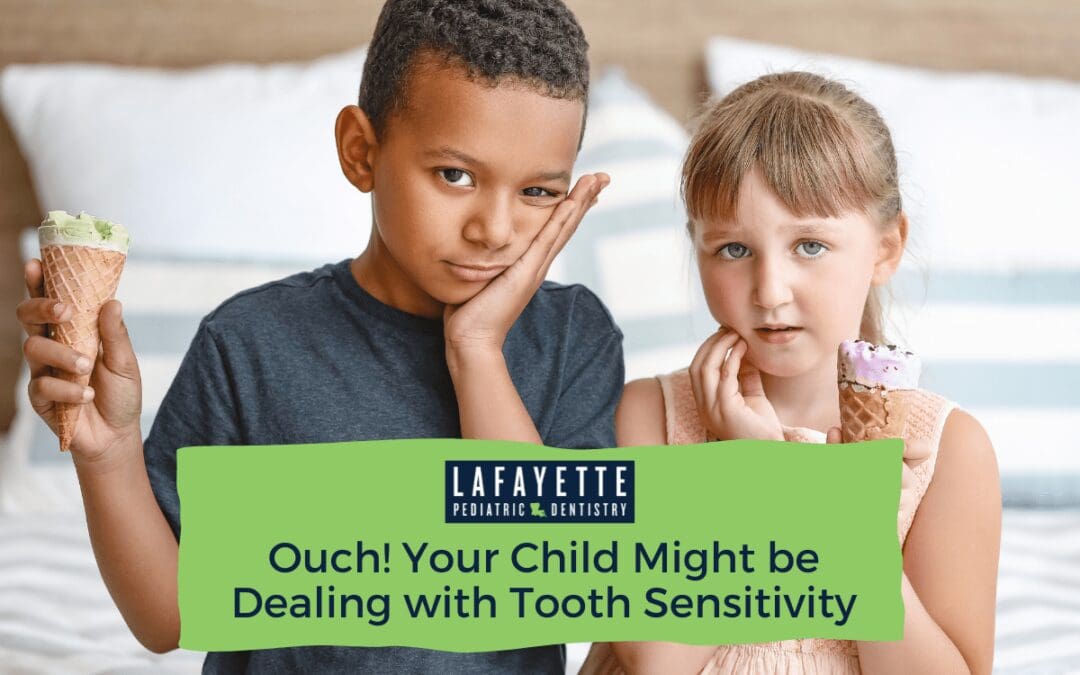Is your child wincing when they bite into ice cream or crying when drinking something cold? Tooth sensitivity could be the culprit behind their dental discomfort.
The good news is tooth sensitivity is often manageable with at-home treatments and adjustments. In this blog, we cover the potential causes of sensitive teeth in kids and our recommendations to manage and prevent flare-ups.
What Causes Tooth Sensitivity?
Tooth sensitivity occurs when the enamel is weakened, exposing the dentin, which is the layer underneath the enamel. The dentin contains microscopic tubules that lead to nerves inside the tooth. When these tubules are exposed, cold, hot, or acidic foods and drinks can reach the nerves and cause discomfort and pain.
There are several possible causes of sensitive teeth in kids:
- Cavities. Tooth decay or cavities can damage the protective enamel coating of teeth and expose the softer dentin underneath. This causes the teeth to become sensitive to certain foods and drinks.
- Cracked or chipped teeth. Cracks and chips in the tooth enamel can also leave the inner tooth layers vulnerable, exposing dentin and leading to sensitivity.
- Gum recession. If the gums recede too much due to gum disease, it uncovers the unprotected tooth roots that lack enamel covering, resulting in a tingling sensation when consuming hot, cold, acidic, or sugary foods and drinks.
- Bruxism or teeth grinding. Chronic teeth grinding can wear down the protective enamel layer over time. As more dentin is exposed, the teeth become increasingly sensitive.
What You Can Do If Your Child Has Sensitive Teeth
Get a Professional Evaluation
Schedule an appointment with your pediatric dentist as soon as you notice your child has sensitive teeth. They can examine your child’s teeth and determine potential causes. Finding the root cause is key to developing an effective management plan.
Consider Preventative Care
Your pediatric dentist may recommend professional fluoride treatments to strengthen tooth enamel. For bruxism, they may fit your child for a mouthguard to wear at night to help prevent further sensitivity.
Read also: Does Your Child Grind Their Teeth at Night?
Use Specialized Toothpaste
Switching your child to a desensitizing toothpaste, such as Sensodyne, can help provide relief for sensitive teeth. These toothpastes contain ingredients like potassium nitrate or stannous fluoride, which are clinically proven to calm the nerve inside the tooth.
Make Dietary Changes
Limit acidic, sugary, and highly acidic foods which can erode tooth enamel over time. Provide more calcium and phosphate-rich foods, such as milk, cheese, yogurt, and almonds, to support remineralization. Keep track of whether certain foods or drinks trigger your child’s sensitivity.
Sensitive teeth can cause discomfort and hinder your child from fully enjoying foods and drinks. Understanding the potential causes can help parents seek professional help and make necessary adjustments at home.
At Lafayette Pediatric Dentistry, our experienced pediatric dental specialists offer comprehensive exams to identify the root cause of sensitivity and create customized treatment plans for your little one. We also offer in-office treatments like fluoride applications and dental sealants to strengthen and shield your child’s teeth.
Read also: Dental Sealants: How They Can Benefit Your Child’s Oral Health
Located in Lafayette, LA, our pediatric dental office proudly serves families in Broussard, Youngsville, Carencro, Breaux Bridge, and surrounding areas. We strive to create positive, stress-free experiences for every child who walks through our doors.
Contact Lafayette Pediatric Dentistry to schedule an appointment with your trusted pediatric dentist in Lafayette, LA. Let us help your child smile brighter and live comfortably.
